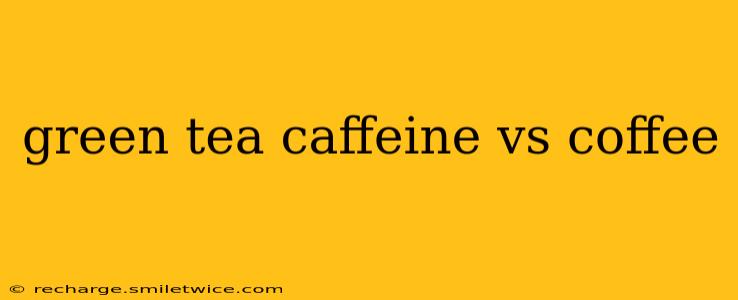Caffeine. That magical molecule that jumpstarts our mornings and fuels our afternoons. But where does the best caffeine come from? Green tea or coffee? Both offer a stimulating kick, but understanding their differences is key to choosing the right brew for your needs and preferences. This in-depth comparison will explore the caffeine content, effects, and overall impact of green tea versus coffee.
How Much Caffeine is in Green Tea vs. Coffee?
This is perhaps the most frequently asked question. The caffeine content varies significantly depending on the type of tea, brewing method, and coffee bean variety. However, we can establish some general guidelines:
-
Coffee: A typical 8-ounce cup of brewed coffee contains anywhere from 80 to 170 milligrams (mg) of caffeine. Espresso shots pack a much higher punch. The caffeine content varies based on bean type, roast level, and brewing method. Robusta beans, for instance, contain almost double the caffeine of Arabica beans.
-
Green Tea: An 8-ounce cup of green tea usually contains between 20 and 40 mg of caffeine. This is significantly less than coffee. The caffeine level can differ based on the type of green tea, brewing time, and leaf quality.
In short: Coffee generally contains significantly more caffeine than green tea.
What are the Effects of Green Tea Caffeine vs. Coffee Caffeine?
While both beverages deliver caffeine, the experience differs due to the presence of other compounds. Coffee's caffeine rush is often sharper and more immediate, leading to a quicker energy boost followed by a more pronounced crash. Green tea, on the other hand, delivers a gentler, more sustained energy release thanks to the presence of L-theanine, an amino acid that promotes relaxation and focus. This combination creates a state of calm alertness, often described as "clear-headed energy."
Does Green Tea Have Less Caffeine Than Coffee?
Yes, green tea consistently contains less caffeine than coffee. As we discussed above, the caffeine content varies, but even the highest caffeine green teas typically fall well below the lowest caffeine coffees.
Is Green Tea Caffeine Better Than Coffee Caffeine?
Whether green tea caffeine is "better" than coffee caffeine is subjective and depends on individual preferences and needs. Coffee provides a stronger, faster energy boost, ideal for those needing an immediate pick-me-up. Green tea's gentler, sustained energy and the added benefits of L-theanine are preferable for many who want sustained focus and calm alertness without the jitters or crash.
Is Green Tea Caffeine Healthier Than Coffee Caffeine?
Both coffee and green tea offer potential health benefits, though their profiles differ. Green tea is rich in antioxidants, particularly catechins, which are linked to various health advantages, including reduced risk of heart disease and certain cancers. Coffee also boasts antioxidant properties and is associated with a lower risk of type 2 diabetes and neurological disorders. The "healthier" choice depends on individual health goals and overall dietary patterns. Both can be part of a healthy lifestyle when consumed in moderation.
How Much Caffeine is Too Much?
The recommended daily caffeine intake varies depending on individual factors like age, weight, and health conditions. Generally, a daily intake of 400 mg of caffeine is considered safe for most healthy adults. However, exceeding this limit can lead to anxiety, insomnia, digestive issues, and other negative effects. It's crucial to listen to your body and adjust your caffeine consumption accordingly.
Conclusion: Choosing Your Caffeine Source Wisely
The choice between green tea and coffee ultimately boils down to personal preference and desired effects. Coffee delivers a powerful, immediate energy boost, while green tea offers a gentler, sustained energy combined with relaxation and focus. Both beverages offer potential health benefits when consumed in moderation. Understanding these differences empowers you to make an informed choice for your specific needs and lifestyle.
